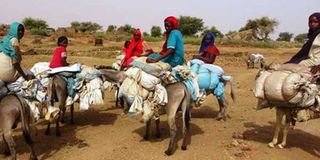Breaking News: At least 10 feared to have drowned in Makueni river
Journey to West Darfur, a pleasant surprise

Girls and their donkeys in West Darfur. PHOTO | JOHN FOX
What you need to know:
- And the visa queue in the airport at Khartoum was fairly tense – understandably so, given the unfavourable reports Sudan has been getting from some visiting media and Western donor agencies. But my own image that I had been carrying about Khartoum was quickly altered.
- There were signs of work still to be done, but the bedrooms were ready: well equipped with air-conditioning – the daytime temperatures were running at around 40 degrees – big beds, TV, and a cleanly-tiled bathroom.
- As I turned off the bedside light, the muezzin was making the call to prayer. It was the most tuneful such call I ever heard. The breakfast was pleasant surprise, too – Scandinavian style, with fresh coffee, boiled eggs, toast with cheeses and jams.
Our Kenya Airways flight arrived in Khartoum at the worst time of day – the middle of the night. Two other planes came at about the same time. Their passengers, most of them, were in long white kanzus and white turbans, Bedouin-style. They looked dazed, and they moved slowly in tight groups. Someone told us they were refugees from the fighting in Yemen.
No airport at three o’clock in the morning, when you have to stand in a queue to get your passport checked and your visa processed, is a happy kind of place. And the visa queue in the airport at Khartoum was fairly tense – understandably so, given the unfavourable reports Sudan has been getting from some visiting media and Western donor agencies. But my own image that I had been carrying about Khartoum was quickly altered.
It was well past four o’clock when we made it to the guest house where we were staying: the Bougainvilla in the quiet Riyad district of the city – especially quiet at that time of day. But the welcome was warm and enthusiastic – especially so since we were the very first guests to stay in the new building.
There were signs of work still to be done, but the bedrooms were ready: well equipped with air-conditioning – the daytime temperatures were running at around 40 degrees – big beds, TV, and a cleanly-tiled bathroom. As I turned off the bedside light, the muezzin was making the call to prayer. It was the most tuneful such call I ever heard. The breakfast was pleasant surprise, too – Scandinavian style, with fresh coffee, boiled eggs, toast with cheeses and jams.
We were on our way to West Darfur. But, first, we had two days in Khartoum. Each evening we took a stroll around the neighbourhood on a search for restaurants – and just to see the sights. Because of the heat, these streets and their shops become alive after dark – alive with cars and tuk-tuks and, like us, people walking.
The first evening we chose an Italian-sounding Turkish restaurant – the Fransisco, specialising in shawarma mutton and chicken. We ate outside, watching passers-by stopping to take a drink from the communal water dispenser, and enjoying the antics of the young and wily street boys.
SWEETEST OF SWEETS
The second evening we walked in another direction and came across a delightful Syrian café, called the Pistacio Aleppo, a treasure-trove of pies and cakes and ice-creams and the sweetest of sweets. We indulged ourselves because we were not sure what Darfur had in store for us.
We need not have worried. We were very well looked after in the guest house in the main town of West Darfur, El Geneina, where we were to stay for six days. In fact, we could have survived even on the offerings at all the interviews and meetings we had in the town – glasses of hot sweet tea and sodas, candies and dates. And it was the same when we went out each day to the countryside.
It is a dry and challenging terrain – a flat land of sand and scrub and occasional acacia trees. We were looking at development projects. Many, of course, were to do with water, to do with small dams and wells and communal water yards. Others were encouraging improved sanitation facilities or focusing on establishing village-based savings and loans groups.
But there is one thing I want to highlight. We never encountered the kind of dependency mentality that we often find in communities that have long experience of aid interventions. These are proud communities in West Darfur.
I will never forget the time on a day out there when we were walking along a wadi, a dry river bed, to the site of a sub-surface dam. Two horsemen appeared on the river bank and came down to ride on the sand. They were sitting so straight on their horses, magnificent in their white robes and turbans. They must have seen me reaching for my camera. So they reined in their horses, turned and posed for the photo. Then they raised their hands and rode off.
And then there are the girls on their donkeys. In the towns you see them, in the villages and in open country. Often they are fetching water; always transporting something. Sometimes they are on their own; sometimes they are in small groups. Transporting? Well, sporting, certainly. It looks like this kind of work can be fun.
West Darfur was not at all as I had imagined. It was welcoming; it was peaceful; it was fascinating. I mentioned something like this to one of the Sudanese colleagues.
“But you had to come here to find that out, didn’t you,” she said.
True enough. I’m glad I went.





